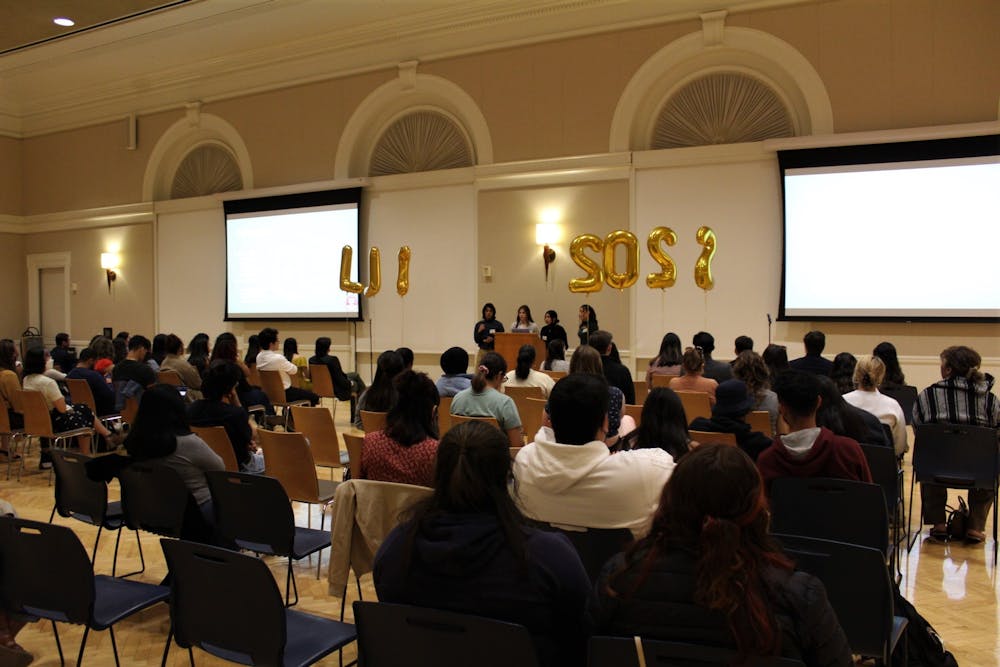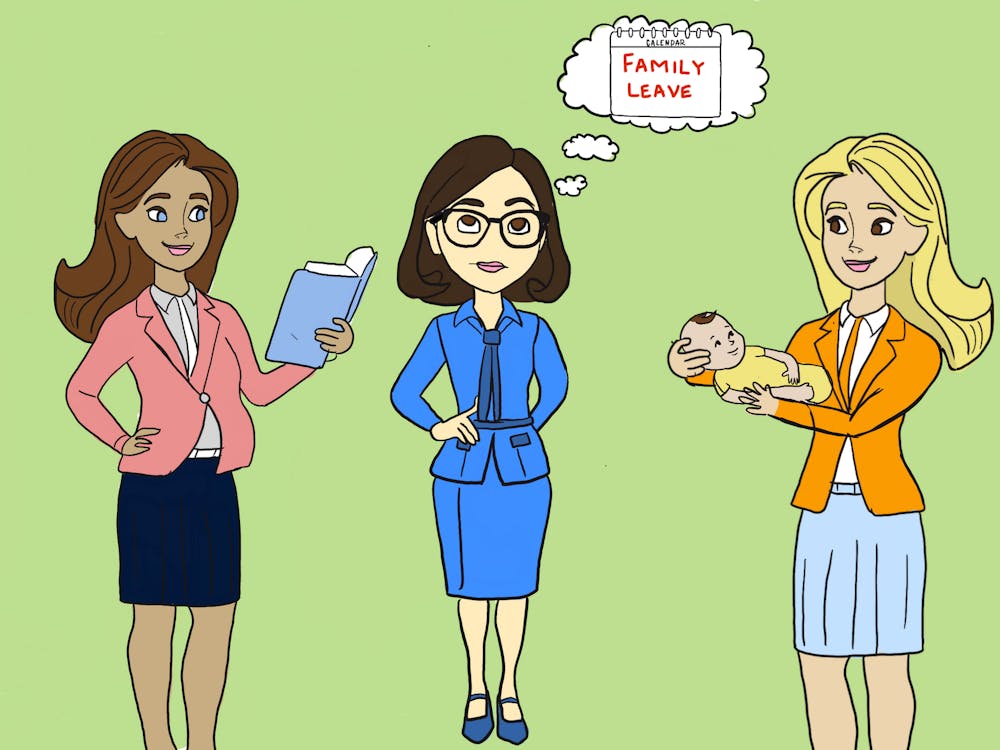The Newcomb Ballroom was brimming with anticipation Wednesday evening as students ambled in and took their seats in front of dual screens, framing golden balloons and a single podium. Sharply-dressed students bustled around in the adjacent ballroom in preparation for big presentations. Administrators, including Associate Dean of Students Vicki Gist and Alex Winkoski, assistant director of Multicultural Student Services, were also in attendance. The evening represented eight weeks of dedicated research and preparation by the fifth Latinx Leadership Institute cohort at the University.
The Latinx Leadership Institute is a leadership development program designed to empower Latinx students and cultivate professional skills. The program is sponsored by MSS under the Office of the Dean of Students and was launched in the spring of 2018 by Class of 2019 alumnus Hector Quijano.
Quijano said he and a few peers came up with the idea for the creation of LLI as a way of consolidating all of the lessons they had learned while students.
“There's just so many opportunities at U.Va.,” Quijano said. “Myself and a lot of my close friends were able to find them through time, connections, professors and students that we met there and I think we wanted to make sure that everyone was aware of them, and was aware that just because you may come from whatever background doesn't mean those opportunities aren't for your taking.”
Recruitment for the LLI takes place in the fall ahead of the program’s sessions, which take place in the spring semester. First, second and third years — as well as transfer students — are welcome to apply and join at the end of each fall semester. Each new recruiting class is called a cohort and participates in weekly sessions throughout the program, engaging in critical conversations about colorism, intersectionality and personal relationships. The cohorts also are given help refining resumes and guidance on how to tackle job interviews in order to help participants navigate professional fields.
Brianna Guevara, second-year College student and cohort member, appreciated the knowledge and skills she gained through LLI.
“Through LLI, we have sessions that touch on how to build the perfect resume, how to interact during interviews — they've helped us prepare us for professional studies, and they also helped us make LinkedIns,” Guevara said.
Throughout the semester, members of the cohort also gather into assigned teams within the cohort to work on a project with the goal of identifying obstacles within the Latinx community.
With these challenges in mind, cohort members present project proposals at the symposium with the hopes of improving the well-being of the Latinx community. Elizabeth Aramayo, fourth-year Batten student and executive director of the LLI, spoke to the significance of the symposium for the LLI.
“Every year we have the symposium to showcase not only what the cohort members have accomplished, but also what they see as the vision for improving not only the Latinx community, but the greater U.Va. community as a whole,” Aramayo said. “I think LLI provides that platform for that community for speaking and communicating these concerns with these injustices “
Students during the symposium spoke about issues such as the lack of resources for prospective University students and career resources for current students as well as the need to create more services to alleviate the stress of financial aid for low-income and first-generation students.
Gist said she found the symposium insightful and especially on being informed on the issues Latinx students are facing.
“It was great to be in [that] space with students and I think what I always enjoy is seeing the students work together, hearing their ideas and the projects that they choose and what that means to them in terms of improving the community,” Gist said. “So I think that to me is always exciting to see what their ideas are and then to think about how we can help them”
LLI has enacted both large and small-scale change. The 2019 cohort successfully proposed and implemented the Latinx Student Center that is now located on the third floor of Newcomb. Students had been advocating for a safe and meaningful space for the Latin American student population to appreciate — something that a Latinx-oriented space would provide. Students also enjoy other benefits from LLI sessions.
“We see higher numbers applying [to Batten and McIntire] now because we have leaders, we have people who have done LLI who have gone through that, because they were given the skills necessary to do those interviews, do those types of applications,” Aramayo said. “LLI prepares individuals to do that to become better leaders.”
Dean Gist hopes to implement some of the students’ ideas and continue putting efforts into creating a more equitable and accessible University for marginalized students.
“We continue to hear concerns about outreach, alumni and admission outreach,” Gist said. “So every year I hear something and I'm like, ‘Oh this, this has come up again, we probably need to figure out how to make this a priority next year.’ And I think one of my goals and one of the things I hope for this program is that the proposals don't just see life for a day and then sort of ‘sit] on a shelf somewhere… so [we’re] really trying to figure out how we can keep students engaged in these ideas that they put forth at the end of this experience.”
Aramayo expressed that one of the most important takeaways she wanted her cohort to attain from the experience was having a more profound and positive sense of identity.
“They were given the knowledge about their identity, latinidad, the problematic nature of colorism and understanding intersectionality in a deep way and also understanding how to leverage their identity, so that it’s [seen as] a strength and not seen as a weakness,” Aramayo said.
As a graduate of the cohort, Guevara now looks to keep having a strong sense of identity and self-confidence as she moves forward and pursues other endeavors.
“I hope to remember the things I've learned … I used to be ashamed of some identity issues, and LLI helped me realize that I shouldn't be ashamed of these things — and I should be proud of these things,” Guevara said. “I hope to keep that mindset in this world.”
After having gone through the entire experience, Guevara invites others to inform themselves on the program and apply.
“I strongly encourage everyone who is Latinx identifying — but I still think you don't have to be Latinx — everyone who can apply, and to really get into the program because it's really what you give is what you take from it,” Guevara said.







